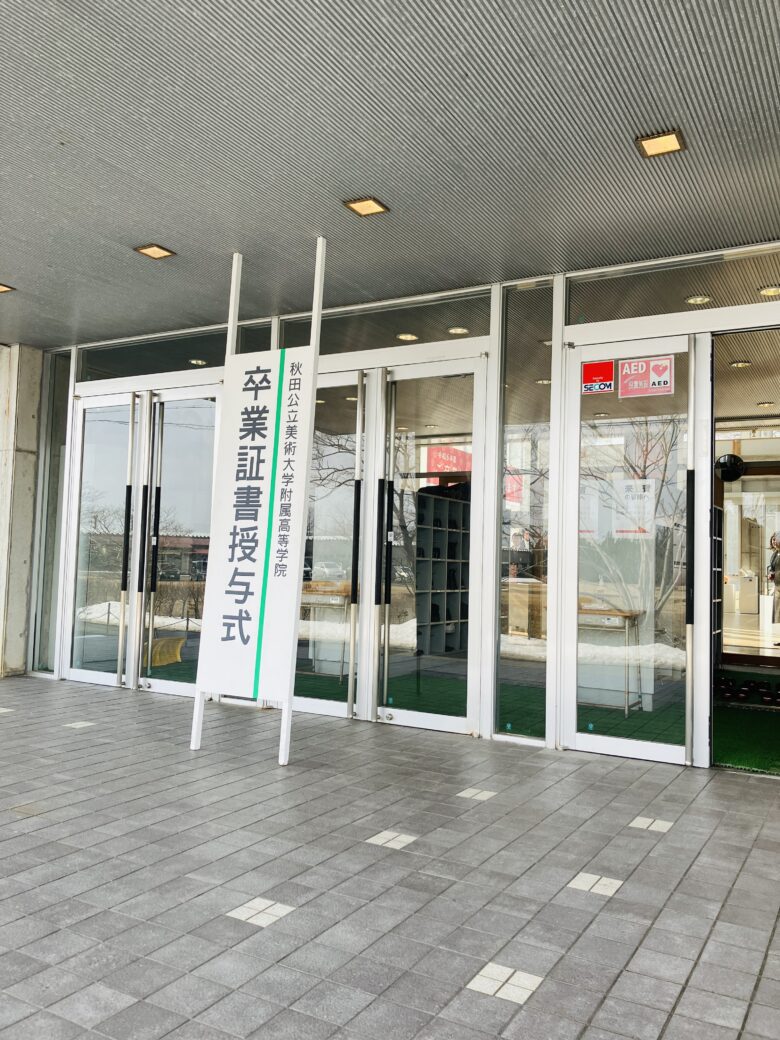令和7年(2025年)3月1日(土)に秋田公立美術大学附属高等学院(通称:美大附)の卒業式があり、来賓として参加してきました。昨年度初めて参加させてもらって魅了されましたが、今年もさらに魅了されました。校長先生の式辞に加え、祝辞が秋田市長だけでなく、秋田公立美術大学長からもあります。
では、何がそんなに良かったのか、と聞かれると、細かな校長先生の式辞のこのお言葉が…とか秋田公立美術大学長のお話が…とか説明はできるのですが、そうすると私の感動が伝わらないような気がして、少し考えていました。
卒業生との会話に出てきた言葉がヒントになりました。卒業生の1人曰く「美大附は外部の団体と関わることは多いのですが、同学年の生徒と関わることは圧倒的に少ない」と。そうか、これか、と思いました。
美大附の生徒さんたちは、3年間かけて圧倒的な力量を身につけていきます。その成長は目を見張るものがあります。彼らは、自分の技術を磨き新たな作品を創り上げることに集中して意識がそちらに向く力が強いのでしょう。当然、普通の高校生と同じように修学旅行や学園祭もあり、学校行事や部活もありますので、クラスの生徒同志で過ごす時間は普通にあります。でも、意識のベクトルが作品に向いているのだと感じました。本来、進学校の生徒であれば、勉学にベクトルを向けるべきなのでしょうけれども、自分も含め、自分を律し勉強する人は一握りであり、クラスの友達と過ごす時間や部活や学校行事へ意識が向きがちです。だから、卒業式といえば、クラスの生徒同士や先輩後輩で思い出を懐かしんだり、勉強よりクラス行事や部活を思い出したりしがちなのでしょう。普通の高校と違って、美大附の生徒さんたちの学校生活は、自分を律し、創り出すことに意識がより向いている人ばかりなのだと思います。
そんな職人のような生活を支えるのは誰か?と考えるとおのずと答えが出てきます。美大附の生徒さん達を支えているのは親御さんたちと教員です。つまり、美大附における卒業式とは、3年間の修行に近い行程を支えてくれた人たちへの生徒からの多大なる感謝と、支えた人たちのやり遂げた気持ちが正面からがっちりと抱き合う一瞬の交差点なのです。1年間でたった1時間しかない感動的で特別な時間なのです。
しかしながら、本来の卒業式とはこうあるべきなのでしょう。生徒は、師や親に感謝し、成長した自分を見せることで、その意を示す。そして、師や親は、その姿や言葉を聞き、未来は明るいと感じる。それを何回も繰り返して世代が交代していく。先の世代のノウハウや誇りが次の世代に渡るのを見て未来に安心するわけです。
自分が高校生の頃に酔いしれた尾崎豊の卒業という歌なんかは、尾崎豊の高校の先生達の視点で見直すと様々なことが見えてきます。生徒が支配と感じるくらい厳しい校則を課した背景には、勉強を教えても覚えもよくない、校則を破り生活態度もよくない、となると、社会に送り出すには先ずは社会にはルールがあって自由なことは少ないことを教えなくてはいけないという先生の生徒への思いがあったのかもしれません。
いずれにせよ、美大附の卒業式は、参加者全員がつくり上げる式の雰囲気、生徒の眼差しや式に臨む態度、校長先生や美大学長の言葉、在校生代表の送辞、それを受けた卒業生代表の答辞…もう全て良くて感動しかありませんでした!
ご卒業おめでとうございます!
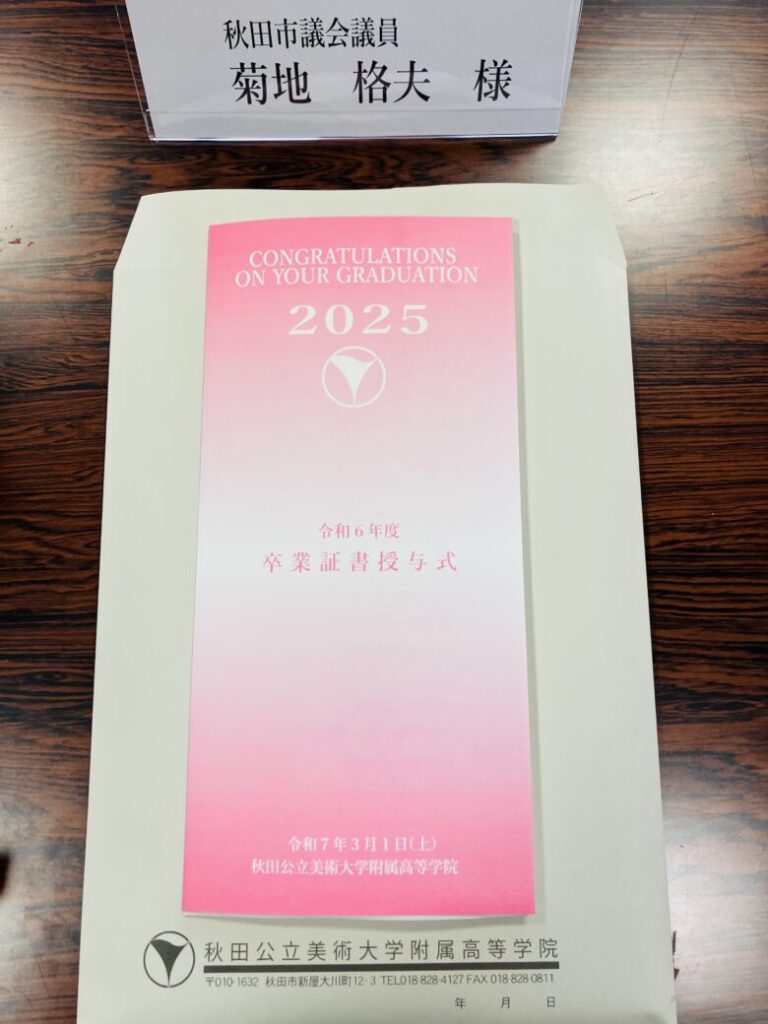
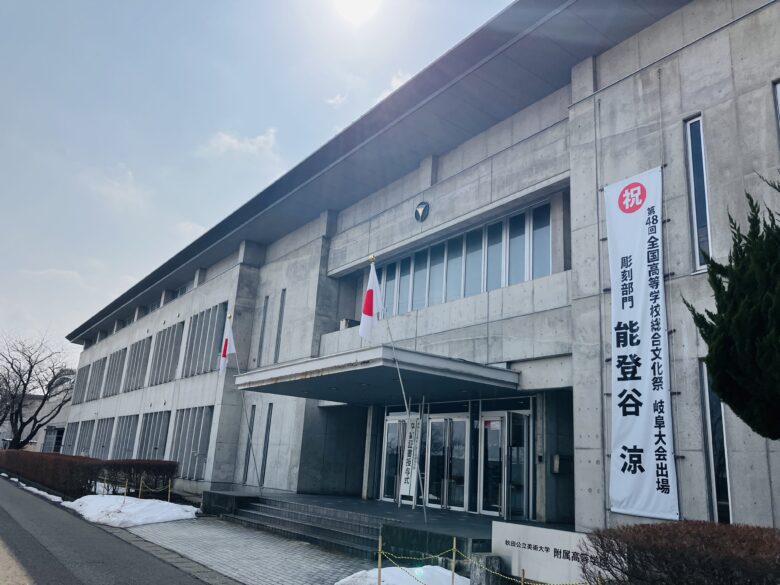
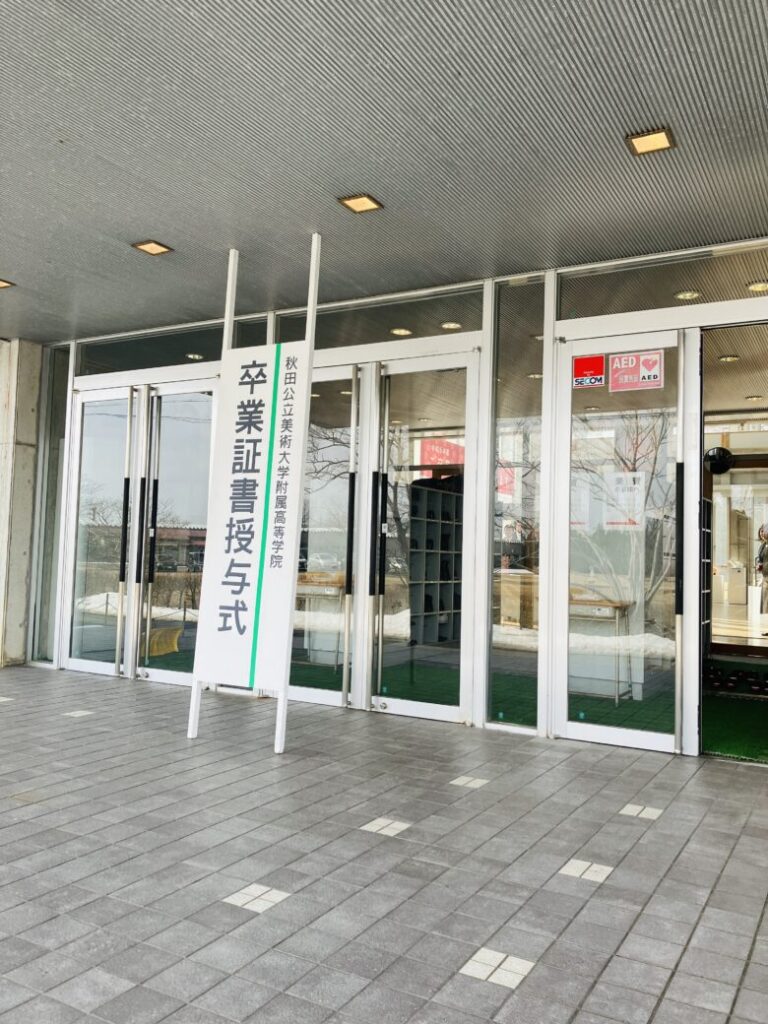
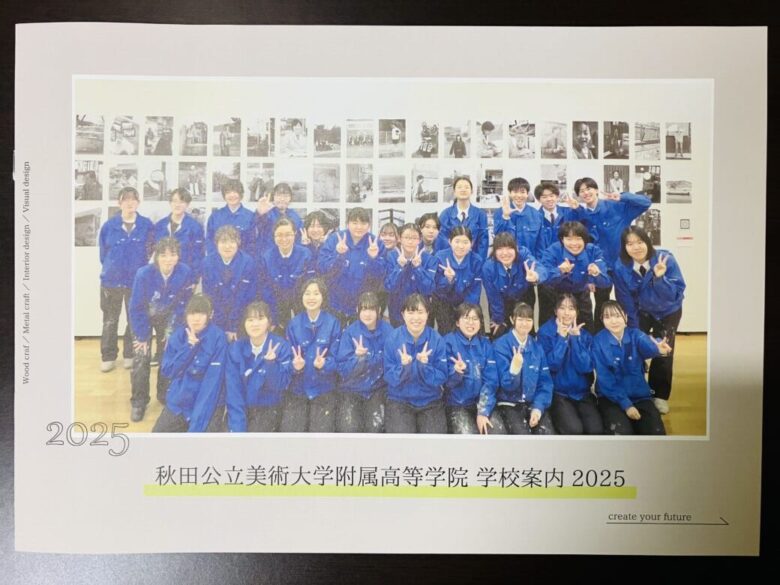
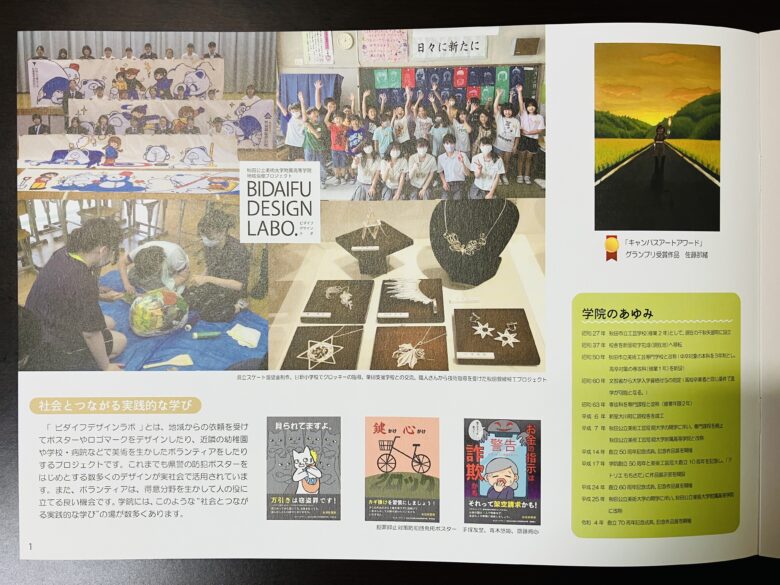
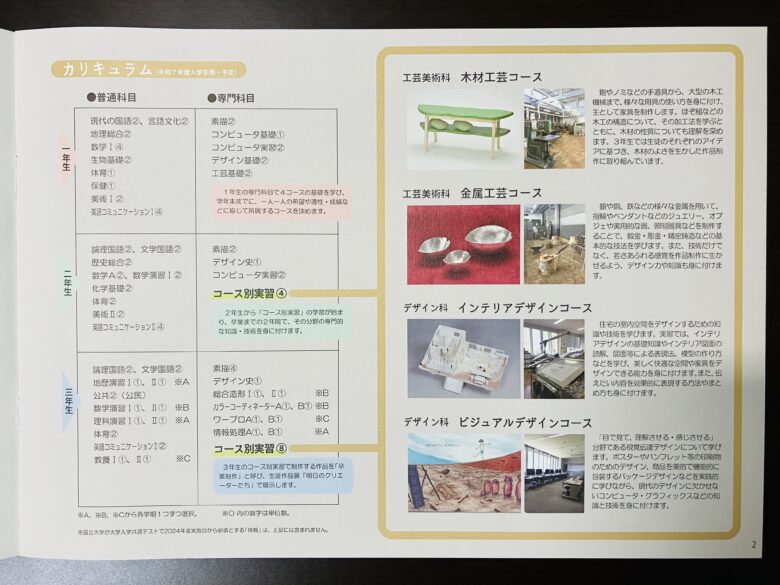
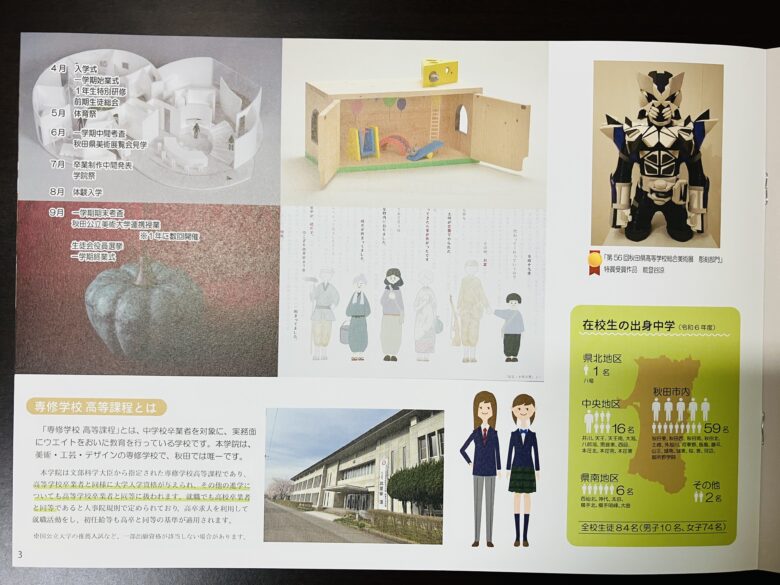
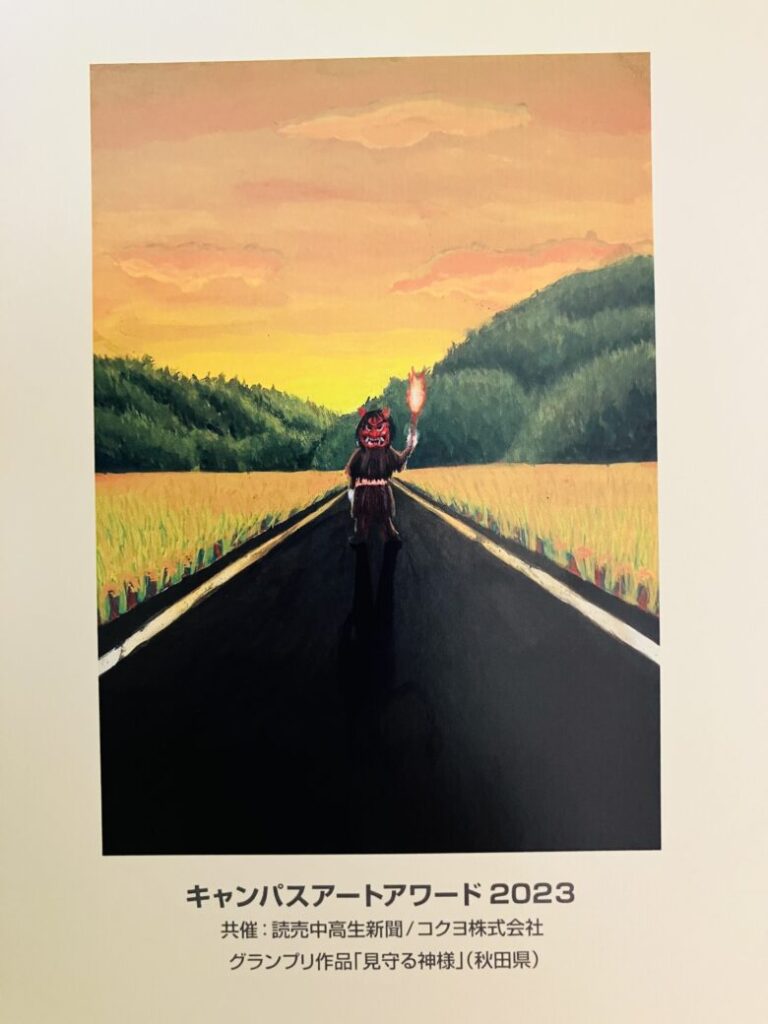
【English】
Graduation Ceremony at Akita Public University of Art High School
On Saturday, March 1, 2025, I attended the graduation ceremony of Akita Public University of Art High School (commonly known as “Bidaifu”) as a guest. I was fascinated when I attended last year for the first time, and this year, I was even more impressed. In addition to the principal’s speech, there were congratulatory addresses from both the Mayor of Akita and the President of Akita Public University of Art.
When asked what was so great about it, I could explain in detail—like quoting specific words from the principal’s speech or the university president’s message. But I felt that wouldn’t fully convey my emotions, so I thought about it for a while.
Then, I found a hint in a conversation with a graduate. One of them said, “At Bidaifu, we interact a lot with external organizations, but we have very little interaction with classmates of the same grade.” That made me realize something.
Students at Bidaifu spend three years developing exceptional skills. Their growth is truly remarkable. They are so focused on refining their techniques and creating new works that their attention is naturally drawn in that direction. Of course, they have school trips, cultural festivals, and club activities like any other high school. They do spend time with their classmates. But I felt that their main focus is on their creative work.
In a typical academic high school, students should ideally focus on their studies. However, in reality—myself included—only a few students truly dedicate themselves to studying. Most tend to focus more on spending time with classmates, club activities, and school events. That’s why, for most students, graduation is a time to reminisce about class memories and club activities rather than academics. But at Bidaifu, students live in a world where they discipline themselves and focus on creation.
So, who supports this craftsman-like life? The answer is clear—it’s the parents and teachers. At Bidaifu, the graduation ceremony is a moment where the deep gratitude of students for their supporters and the sense of accomplishment of those who supported them come together in a powerful, emotional intersection. This special moment lasts only about an hour once a year, but it is incredibly moving.
Perhaps this is what a true graduation ceremony should be. Students show their gratitude to their mentors and parents by demonstrating their growth. In return, teachers and parents see that growth and feel hopeful for the future. This cycle repeats, allowing generations to pass on knowledge and pride, ensuring a bright future.
Looking back, when I was in high school, I was deeply moved by Yutaka Ozaki’s song Graduation. But if I view it from the perspective of Ozaki’s high school teachers, I see a different picture. The strict school rules that students felt as oppression likely had a reason—perhaps teachers believed that, since some students struggled with academics and discipline, they needed to first learn that society has rules and that true freedom is limited.
In any case, the graduation ceremony at Bidaifu was amazing. Everything—from the atmosphere created by all participants, the students’ expressions and attitude, the speeches from the principal and the university president, the farewell speech from the current students, and the response from the graduates—was deeply moving.
Congratulations to all the graduates!
【Español】
Ceremonia de Graduación en el Colegio Anexo de la Universidad Pública de Arte de Akita
El sábado 1 de marzo de 2025, asistí como invitado a la ceremonia de graduación del Colegio Anexo de la Universidad Pública de Arte de Akita (conocido como “Bidaifu”). El año pasado, cuando fui por primera vez, me dejó fascinado, y este año me impresionó aún más. Además del discurso del director, hubo mensajes de felicitación tanto del alcalde de Akita como del rector de la Universidad Pública de Arte de Akita.
Si me preguntan qué fue lo mejor, podría dar una explicación detallada, mencionando frases específicas del discurso del director o del rector. Pero sentí que eso no transmitiría completamente mi emoción, así que reflexioné un poco.
Y entonces, en una conversación con un graduado, encontré una pista. Uno de ellos dijo: “En Bidaifu interactuamos mucho con organizaciones externas, pero tenemos muy poca interacción con nuestros compañeros de la misma generación”. Y ahí entendí algo.
Los estudiantes de Bidaifu pasan tres años desarrollando habilidades excepcionales. Su crecimiento es realmente impresionante. Como están tan enfocados en perfeccionar sus técnicas y crear nuevas obras, su atención se centra naturalmente en eso. Por supuesto, tienen viajes escolares, festivales culturales y actividades extracurriculares como cualquier otro colegio. También comparten tiempo con sus compañeros de clase. Pero sentí que su enfoque principal está en su trabajo creativo.
En un colegio académico tradicional, los estudiantes deberían centrarse en los estudios. Sin embargo, en la realidad—y me incluyo—solo unos pocos realmente se dedican al estudio. La mayoría tiende a enfocarse más en compartir con amigos, en actividades extracurriculares y en eventos escolares. Por eso, en la mayoría de los colegios, la graduación es un momento para recordar anécdotas con los compañeros y revivir momentos en clubes y eventos, más que en los estudios. Pero en Bidaifu, los estudiantes viven en un mundo donde se autodisciplinan y enfocan en la creación.
Entonces, ¿quiénes apoyan este estilo de vida tan dedicado? La respuesta es clara: los padres y los profesores. En Bidaifu, la ceremonia de graduación es el momento en que el profundo agradecimiento de los estudiantes hacia quienes los apoyaron y el orgullo de quienes los guiaron se encuentran en una intersección poderosa y emotiva. Es un instante único que solo ocurre una vez al año y dura alrededor de una hora, pero que es increíblemente conmovedor.
Quizás así debería ser una verdadera graduación. Los estudiantes muestran su gratitud a sus maestros y padres demostrando cuánto han crecido. Y los profesores y padres, al ver ese crecimiento, sienten esperanza por el futuro. Este ciclo se repite, permitiendo que las generaciones transmitan su conocimiento y orgullo, asegurando un futuro brillante.
Recordando mis días de colegio, me viene a la mente la canción Graduación de Yutaka Ozaki, que en su momento me marcó mucho. Pero si la veo desde la perspectiva de los profesores de Ozaki, entiendo otro lado de la historia. Tal vez esas estrictas reglas escolares, que los estudiantes sentían como opresión, tenían un propósito. Quizás los maestros pensaban que, si algunos alumnos no eran buenos en los estudios ni en la disciplina, lo primero que debían aprender era que la sociedad tiene reglas y que la verdadera libertad es limitada.
En cualquier caso, la ceremonia de graduación en Bidaifu fue increíble. Todo—el ambiente creado por los participantes, la mirada y actitud de los estudiantes, los discursos del director y el rector, las palabras de despedida de los estudiantes actuales y la respuesta de los graduados—fue pura emoción.
¡Felicidades a todos los graduados!

